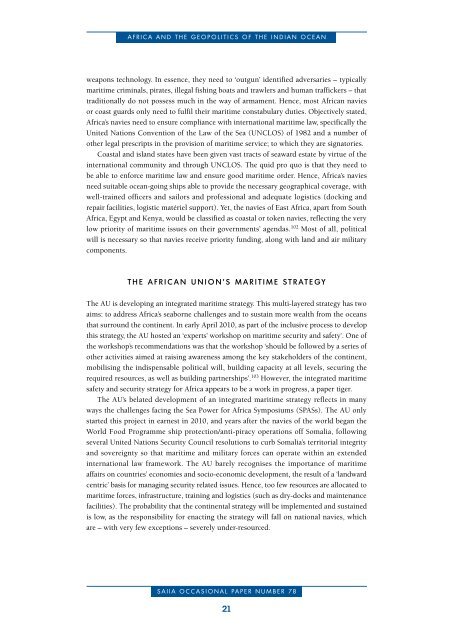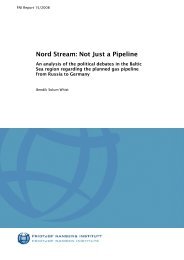Africa and the Geopolitics of the Indian Ocean
Africa and the Geopolitics of the Indian Ocean
Africa and the Geopolitics of the Indian Ocean
Create successful ePaper yourself
Turn your PDF publications into a flip-book with our unique Google optimized e-Paper software.
AfRICA ANd thE gEOPOLItICS Of thE INdIAN OCEAN<br />
weapons technology. In essence, <strong>the</strong>y need to ‘outgun’ identified adversaries – typically<br />
maritime criminals, pirates, illegal fishing boats <strong>and</strong> trawlers <strong>and</strong> human traffickers – that<br />
traditionally do not possess much in <strong>the</strong> way <strong>of</strong> armament. Hence, most <strong>Africa</strong>n navies<br />
or coast guards only need to fulfil <strong>the</strong>ir maritime constabulary duties. Objectively stated,<br />
<strong>Africa</strong>’s navies need to ensure compliance with international maritime law, specifically <strong>the</strong><br />
United Nations Convention <strong>of</strong> <strong>the</strong> Law <strong>of</strong> <strong>the</strong> Sea (UNCLOS) <strong>of</strong> 1982 <strong>and</strong> a number <strong>of</strong><br />
o<strong>the</strong>r legal prescripts in <strong>the</strong> provision <strong>of</strong> maritime service; to which <strong>the</strong>y are signatories.<br />
Coastal <strong>and</strong> isl<strong>and</strong> states have been given vast tracts <strong>of</strong> seaward estate by virtue <strong>of</strong> <strong>the</strong><br />
international community <strong>and</strong> through UNCLOS. The quid pro quo is that <strong>the</strong>y need to<br />
be able to enforce maritime law <strong>and</strong> ensure good maritime order. Hence, <strong>Africa</strong>’s navies<br />
need suitable ocean-going ships able to provide <strong>the</strong> necessary geographical coverage, with<br />
well-trained <strong>of</strong>ficers <strong>and</strong> sailors <strong>and</strong> pr<strong>of</strong>essional <strong>and</strong> adequate logistics (docking <strong>and</strong><br />
repair facilities, logistic matériel support). Yet, <strong>the</strong> navies <strong>of</strong> East <strong>Africa</strong>, apart from South<br />
<strong>Africa</strong>, Egypt <strong>and</strong> Kenya, would be classified as coastal or token navies, reflecting <strong>the</strong> very<br />
low priority <strong>of</strong> maritime issues on <strong>the</strong>ir governments’ agendas. 102 Most <strong>of</strong> all, political<br />
will is necessary so that navies receive priority funding, along with l<strong>and</strong> <strong>and</strong> air military<br />
components.<br />
thE AfRICAN uNIoN’S MARItIME StRAtEGy<br />
The AU is developing an integrated maritime strategy. This multi-layered strategy has two<br />
aims: to address <strong>Africa</strong>’s seaborne challenges <strong>and</strong> to sustain more wealth from <strong>the</strong> oceans<br />
that surround <strong>the</strong> continent. In early April 2010, as part <strong>of</strong> <strong>the</strong> inclusive process to develop<br />
this strategy, <strong>the</strong> AU hosted an ‘experts’ workshop on maritime security <strong>and</strong> safety’. One <strong>of</strong><br />
<strong>the</strong> workshop’s recommendations was that <strong>the</strong> workshop ‘should be followed by a series <strong>of</strong><br />
o<strong>the</strong>r activities aimed at raising awareness among <strong>the</strong> key stakeholders <strong>of</strong> <strong>the</strong> continent,<br />
mobilising <strong>the</strong> indispensable political will, building capacity at all levels, securing <strong>the</strong><br />
required resources, as well as building partnerships’. 103 However, <strong>the</strong> integrated maritime<br />
safety <strong>and</strong> security strategy for <strong>Africa</strong> appears to be a work in progress, a paper tiger.<br />
The AU’s belated development <strong>of</strong> an integrated maritime strategy reflects in many<br />
ways <strong>the</strong> challenges facing <strong>the</strong> Sea Power for <strong>Africa</strong> Symposiums (SPASs). The AU only<br />
started this project in earnest in 2010, <strong>and</strong> years after <strong>the</strong> navies <strong>of</strong> <strong>the</strong> world began <strong>the</strong><br />
World Food Programme ship protection/anti-piracy operations <strong>of</strong>f Somalia, following<br />
several United Nations Security Council resolutions to curb Somalia’s territorial integrity<br />
<strong>and</strong> sovereignty so that maritime <strong>and</strong> military forces can operate within an extended<br />
international law framework. The AU barely recognises <strong>the</strong> importance <strong>of</strong> maritime<br />
affairs on countries’ economies <strong>and</strong> socio-economic development, <strong>the</strong> result <strong>of</strong> a ‘l<strong>and</strong>ward<br />
centric’ basis for managing security related issues. Hence, too few resources are allocated to<br />
maritime forces, infrastructure, training <strong>and</strong> logistics (such as dry-docks <strong>and</strong> maintenance<br />
facilities). The probability that <strong>the</strong> continental strategy will be implemented <strong>and</strong> sustained<br />
is low, as <strong>the</strong> responsibility for enacting <strong>the</strong> strategy will fall on national navies, which<br />
are – with very few exceptions – severely under-resourced.<br />
SAIIA OCCASIONAL PAPER NUMBER 78<br />
21













